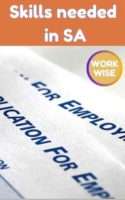How tough is the work situation at the moment? So many people are struggling to find a job and it seems as if there are very few job opportunities out there. And, yes, to a large extent this is true. But have you thought about the fact that many people are competing for the same kind of jobs? What if you had to study towards a job where there is an actual shortage of people able to do them in South Africa? That would definitely put you into a much better position for getting a job.
South Africa does have a shortage of people able to do certain types of work. In fact, the government puts out a Critical Skills List every now and again and the latest draft was published in the Government Gazette in February 2021.
Over time, the economic and technical needs of industries and businesses change in a country. South Africa has been going through a period of rapid change, especially in the field of IT and the move towards a more digital world. Prior to about mid-1990s computers where specialist machines used by the few. These days, most people have access to some kind of digital platform be it a laptop, smart phone or tablet. This means that more and more people need to be trained in the tech field that deals with the hardware (the actual machinery), the software (the programs) and the data collection on these platforms.
Another field that is urgently looking for young people to qualify in is agriculture. Food security always remains an important factor for any country, especially one with a growing population, such as South Africa. There has been a move to involve small and medium-scale farmers in food production which means that there is a greater need for skilled workers. Women, in particular, are sought after in the agricultural field as they have been under-represented in the past and they bring a number of strengths to the job.
So critical skills are often found in an environment where the work is ‘new’ or ‘adapting’ and not many people have the skills to do the work. This means that the companies are desperately looking for people who have those skills and, if you have them, you are much more likely to get work than if you were looking for more traditional roles.
So what types of skills are considered critical at the moment?
Here is a summary of some of the jobs where skills are scarce:
– Actuary
– Advertising specialist
– Agricultural farm manager
– Application development manager
– Architect
– Chef
– Chief information officer
– Civil Engineer
– Data Scientist
– Digital artist
– Dockmaster
– Draughts person
– FET college principal
– Fraud examiner
– General accountant
– General medical practitioner
– Geologist
– Geophysicist
– Hydrologist
– ICT project manager
– ICT security specialist
– ICT systems analyst
– Industrial engineer
– Internal auditor
– Investment advisor
– Manufacturer
– Mechanical engineer
– Multimedia designer
– Network analyst
– Quantity surveyor
– Registered nurse
– Web developer
As you can see, there are a number of different fields that you can get involved in. The coronavirus pandemic highlighted the shortage of medical staff such as nurses and pharmacists – an area wide open to both women and men. Like agriculture, nursing is an area in which both males and females are encouraged to work.
There are a number of other sectors that are also short of skilled workers.
See the full list here. Available as a PDF download called: 44164 18-2 Home Affairs.
Although some of these areas have slowed down because of the pandemic, these skills are still critical and, as the economy recovers, so people qualified in these areas will be in demand again.
It’s really helpful to be in tune with the needs of the country as you begin to choose your career path. Looking at the Critical Skills List is an important resource to use. Should you decide to qualify in one of the areas with a skills shortage, you will find it easier to find work once your studies are completed. Keep in mind, though, that things are changing quickly in the 21st Century so it’s important to remain adaptable and to add to your studies as things change.
Tell us: Are you interested in a career in one of these fields? If so, which one?
Next week we will be running a blog on Actuaries.


